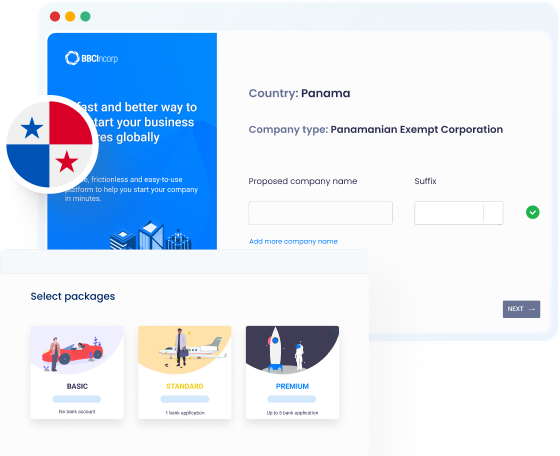Offshore Company Formation with Continuous Compliance Management
Offshore Company Formation with Continuous Compliance Management
Blog Article
Navigating the Globe of International Business: Insights on Offshore Company Formation
Offshore Company Formation presents a strategic opportunity for global service procedures. It uses noteworthy advantages, such as tax obligation optimization and improved privacy. The process is not without its challenges. Understanding the complexities of regulative demands and numerous territories is vital. As services take into consideration these alternatives, the actions entailed can significantly affect their long-lasting success. What are the key factors that can result in effective overseas administration?
Understanding Offshore Firms: Meaning and Objective
Offshore business have ended up being a focal factor in worldwide organization discussions as a result of their distinct legal and financial frameworks. These entities are developed in territories outside of the proprietor's country of residence, usually with positive governing atmospheres. Generally, overseas firms offer numerous functions, such as asset protection, tax obligation optimization, and improved personal privacy. They can operate in multiple industries including profession, financing, and modern technology, supplying versatility for international operations.The specifying quality of an offshore Company is its capability to carry out company globally while gaining from minimized tax obligation obligations and governing problems. This structure allures to business owners and financiers seeking to expand their portfolios and take care of risks successfully. Additionally, many overseas territories offer incentives to draw in international investment, leading to a boost in the Formation of these companies. Recognizing the definition and objective of overseas business is important for navigating via the complexities of worldwide commerce and capital circulation.
Secret Advantages of Offshore Company Formation
The Formation of an overseas Company uses a number of compelling advantages that draw in entrepreneurs and financiers alike. One of the main advantages is tax optimization; numerous jurisdictions offer favorable tax obligation rates or exemptions, enabling services to optimize earnings. Additionally, overseas companies usually delight in greater privacy, as lots of territories have stringent personal privacy regulations securing the identifications of Company owners and shareholders.Another significant benefit is property defense. Offshore entities can guard possessions from political instability and economic slumps in the owner's home country. In addition, these firms can help with international profession, supplying very easy access to worldwide markets and streamlining cross-border transactions.The adaptability in company framework likewise attract company owner, as overseas firms can be tailored to satisfy details operational needs. On the whole, the critical Formation of an offshore Company can cause enhanced financial security, operational efficiency, and a durable global presence.

Usual Difficulties in Establishing Offshore Entities
Establishing offshore entities presents several difficulties that services need to navigate. Key concerns consist of regulatory conformity, which can vary significantly throughout territories, and the influence of social distinctions on operations. Furthermore, organizations should take into consideration the risks and expenses connected with preserving an overseas existence, which can influence total stability.
Governing Conformity Issues
When they seek to establish overseas entities, steering regulative compliance concerns postures substantial difficulties for organizations. Each jurisdiction has its own set of laws and guidelines, which can differ commonly and may be difficult to browse. Companies often deal with challenges pertaining to tax obligation conformity, anti-money laundering regulations, and reporting demands. Furthermore, modifications in global tax regulations can develop unpredictability, making it essential for organizations to remain updated on conformity commitments. Failure to comply with these regulations can cause severe fines, including fines and reputational damage. Engaging and understanding the legal structure with neighborhood experts is necessary for effective overseas procedures, making sure that organizations can operate within the confines of the law while optimizing their worldwide technique.
Cultural Differences Effect

Cost Considerations and Risks
Guiding via the economic landscape of offshore entity Formation provides different expense factors to consider and integral threats. First setup costs commonly include lawful costs, registration costs, and conformity charges, which can collect considerably. Additionally, continuous upkeep expenses such as annual charges and accounting services need to be factored in. Additionally, fluctuating regulative atmospheres in different jurisdictions present dangers, possibly causing unforeseen costs or legal problems. Businesses might likewise encounter challenges related to taxes, financial, and reputational issues, which can impact success and operational efficiency. Possible entrepreneurs need to conduct thorough due persistance and monetary forecasting to minimize these risks and assure sustainable growth. Recognizing these expense considerations is vital for effective overseas organization endeavors.
Actions to Set Up an Offshore Company
Establishing an offshore Company includes numerous vital actions that need mindful consideration. Key elements consist of making sure and picking the appropriate territory conformity with neighborhood regulations, together with collecting required documentation. Comprehending these elements is essential for a successful overseas organization setup.
Picking the Right Territory
Picking the appropriate jurisdiction is critical for anyone wanting to set up an offshore Company, as it can substantially impact the company's lawful obligations, tax responsibilities, and functional convenience. Different aspects should be considered, consisting of the political security, regulatory setting, and tax incentives provided by potential territories. Popular options commonly consist of countries with favorable tax obligation regimens, such as the British Virgin Islands or Cayman Islands, because of their low or absolutely no tax prices. In addition, the simplicity of working and the credibility of the jurisdiction can influence financier self-confidence and market gain access to. Inevitably, a well-informed decision based on thorough research study will certainly assure the overseas Company is positioned for lasting success and compliance with global criteria.
Needed Documents and Compliance
When establishing up an offshore Company, comprehending the required paperwork and this content compliance needs is important to ensure a smooth procedure. Key records generally consist of a certificate of incorporation, a memorandum and posts of organization, and proof of identification for shareholders and supervisors. Some territories may call for added information, such as company strategies or financial institution references. Compliance with regional laws is essential, which frequently includes assigning a signed up agent and maintaining an authorized workplace. Routine coverage and adherence to tax commitments need to also be thought about. Failure to follow these requirements can bring about charges or perhaps dissolution of the Company. Complete prep work and consultation with lawful specialists can help navigate these complexities successfully.
Choosing the Right Jurisdiction for Your Offshore Company
How can one establish the most suitable territory for an overseas Company? Selecting the ideal territory needs that site cautious factor to consider of numerous variables. Initially, the lawful and tax atmosphere plays a vital role; jurisdictions with beneficial tax obligation regimes may boost business success. In addition, the political stability and economic environment of a location can influence long-term business viability.Another crucial element is the availability of financial solutions and banking infrastructure, which promote smooth procedures. Potential local business owner need to additionally take into consideration the simplicity of doing company, including the rate of enrollment and the clarity of regulations.Furthermore, language obstacles and cultural distinctions can impact operations; consequently, lining up with a territory that lines up with company goals and individual comfort is necessary. Ultimately, comprehensive study and professional recommendations can lead business owners in making a notified choice that lines up with their strategic goals.
Compliance and Governing Considerations

Best Practices for Handling an Offshore Company
Taking care of an overseas business requires calculated preparation and meticulous execution to maximize efficiency and reduce threats. First, establishing a durable compliance structure is important to navigate differing guidelines across territories. Routine audits and threat analyses aid determine possible vulnerabilities.Moreover, leveraging neighborhood knowledge through partnerships with regional experts can enhance functional performance and cultural understanding. Making use of technology, such as cloud-based administration systems, streamlines communication and information administration, enabling better decision-making. In addition, maintaining transparent monetary records and making certain timely tax filings are vital to support the Company's stability. Purchasing team training and advancement promotes a competent labor force, promoting innovation and adaptability.Finally, establishing clear performance metrics and vital performance indicators (KPIs) assists evaluate service progress and educate calculated modifications. By sticking to these finest practices, business can successfully manage their overseas operations, guaranteeing long-term success and sustainability in a competitive global industry.
Often Asked Questions
What Is the Cost of Developing an Offshore Company?
The cost of creating an offshore Company differs commonly depending on territory, legal requirements, and services needed. Usually, costs can vary from a few hundred to several thousand dollars, including registration, compliance, and yearly costs.
The length of time Does It Require To Establish an Offshore Entity?
The time needed to establish an overseas entity differs considerably, normally varying from a few days to several weeks (offshore company formation). Variables affecting this period include territory, required documents, and the performance of the provider involved
Can Individuals Kind Offshore Companies Without an Organization Partner?
Individuals can without a doubt form overseas firms without a company companion. Lots of jurisdictions enable single-member entities, encouraging entrepreneurs to establish and manage their organizations individually, while still benefiting from prospective tax obligation benefits and lawful securities.
Exist Any Tax Benefits for Foreign Investors?

What Kind Of Services Commonly Utilize Offshore Firms?
Offshore companies are regularly used by numerous industries, consisting of ecommerce, money, and modern technology. These entities frequently offer purposes such as asset security, tax obligation optimization, and personal privacy, attracting both international firms and private business owners. Offshore companies have ended up being a focal factor in worldwide business discussions due to their distinct legal and economic structures. They can operate in several fields consisting of money, innovation, and profession, offering versatility for worldwide operations.The defining quality of an offshore Company is its ability to conduct business internationally while profiting from reduced tax obligation responsibilities and governing burdens. Additionally, offshore business usually enjoy greater confidentiality, as numerous territories have strict personal privacy legislations shielding the identities of Company proprietors and shareholders.Another substantial advantage is asset protection. These firms can facilitate global profession, offering easy access to worldwide markets and simplifying cross-border transactions.The flexibility in corporate framework likewise appeals to service proprietors, as offshore companies can be tailored to satisfy particular operational requirements. Choosing the ideal jurisdiction is important for anybody looking to set up an offshore Company, as it can substantially influence the business's legal commitments, tax responsibilities, and operational convenience.
Report this page